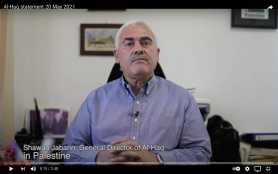Addressing the international community, and its leaders, Shawan Jabarin, the General Director of Al-Haq, highlighted how the international community’s lack of political will to hold Israel to an account has allowed Israel to commit crimes against the Palestinian people as a whole. Israel’s colonial-apartheid regime, established and maintained since the Nakba of 1948, continue to deny the Palestinian people their inalienable collective rights, including the right to self-determination and to return.
In his message, Mr. Jabarin asserts that Israel’s lack of accountability, and the exceptionalism of the situation in Palestine will affect how Palestinians perceive international law, especially in the minds of the youth. As such, Mr. Jabarin urged that the international community to maintain the seeds of hope in Palestinian minds, through respecting and implementing their legal obligations under international law. Mr. Jabarin ended his message, asserting that “no peace without justice, and no justice without accountability.”
After the United States had blocked three of the UN Security Council statements, the UN General Assembly will hold, today, an additional, joint debate on agenda item 37, entitled “The situation in the Middle East,” and item 38, entitled the “Question of Palestine,” during its seventy-fifth session. Al-Haq provides that the root causes of the prolonged denial of Palestinian rights must be addressed. Al-Haq calls on the UN General Assembly and Member States to:
- Call on Israel to cease immediately its military offensive in the Gaza Strip, attacks on Palestinians in the West Bank, including East Jerusalem and Palestinian citizens of Israel;
- Recognise and condemn Israel’s apartheid regime over the Palestinian people as a whole, as an internationally wrongful act; and reconstitute the United Nations Special Committee on Apartheid and UN Centre against Apartheid;
- Ensure the implementation of international law and the protection of the Palestinian people, including through the implementation of sanctions and other measures, until Israel adheres to its international obligations under the UN Charter, including the prohibition on the acquisition of territory through use of force;
- Unilaterally or collectively implement comprehensive trade sanctions against Israel, to ensure Israel’s compliance with international law and prevent further erasure of Palestinian presence from the occupied territory. Particular emphasis should be given to the need to end the sale or supply of military products to Israel;
- End all trade in weapons with Israel through a two-way arms embargo and end military-security cooperation;
- Implement laws banning the import of goods produced in illegal settlements located in any occupied territory, having particular reference to UNSC resolution 2334 (2016) and the UN’s 2020 report on business enterprises involved in certain activities relating to settlements in the occupied Palestinian territory;
- Call on Israel to immediately repeal all laws it has enacted to further the Israeli policy of population transfer and achieve its demographic goals in Jerusalem, in violation of Palestinians’ fundamental rights, including their right to self-determination and right to return and reclaim their properties, including 1950 Absentees’ Property Law and the 1970 Legal and Administrative Matters Law;
- Urge Israel to immediately and urgently lift the land, air, and sea closure of the Gaza Strip;
- Address Israel’s settler-colonial regime, and take effective and concrete measures to dismantle such regime, end Israel’s military occupation and de facto and de jure annexation of Palestine; and
- Call for the UN General Assembly to Request and Advisory Opinion from the International Court of Justice on the questions of Israel’s institutionalised racial discrimination and domination over the Palestinian people as a whole, as amounting to an apartheid regime, in addition to an examination to the illegality of the occupation.


